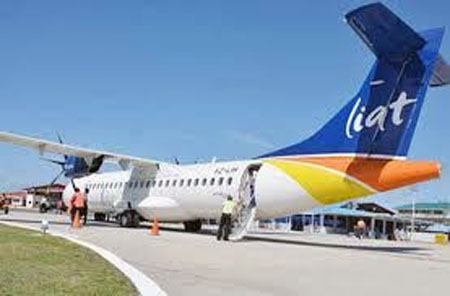Prime Minister Gaston Browne will either be regarded in history as one of the finest finance minds of his era or a foolhardy and irrational leader who tied his, and by extension, Antigua and Barbuda’ fortunes to LIAT’s rebirth only to watch it sink into the deep blue Caribbean Sea. Either way, his Administration seems determined to move forward with plans to restructure and ‘resurrect’ the defunct LIAT 1974 Ltd replacing it with a fresh, new, and according to him, more efficient LIAT 2020 Ltd.
On June 27th 2020 the majority shareholder Governments of LIAT 1974 Ltd considered a proposal from its Board of Directors to liquidate the airline. At this meeting, Antigua and Barbuda’s position was that rather than liquidate the airline there should be a quick transition to the creation of a new airline – LIAT 2020 Ltd formed out of its restructured predecessor. The proposal did not receive support from both the Governments of Barbados and St. Vincent and the Grenadines, the combined majority shareholders.
A breakthrough however was arrived at the shareholder’s meeting on Monday 20th July 2020, where the Governments of St. Vincent and the Grenadines and Barbados agreed to sell their shares to the Government of Antigua and Barbuda for E.C. $1.00. Thus, Antigua and Barbuda became the principal and largest shareholder in the airline. The other shareholder is the government of Dominica.
The Government of Antigua and Barbuda wasted no time in bringing about the changes necessary to restructure the airline. They secured a court victory that saw the removal of CEO of the airline, Julie Reifer-Jones and the replacement of a court appointed administrator Cleveland Seaforth.
To be fair to Prime Minister Gaston Browne, several arguments raised against the proposed liquidation and in favor of restructuring do seem persuasive. For one thing, liquidation is a costly exercise that further erodes any short-term revenues recouped from a fire-sale of the assets of the airline. One such cost is a 16.4M E.C. liquidation cost which arguably might be better spent in a proposed restructuring.
Further, if the analysis put forward by the Prime Minster Browne is correct, any proposed fire-sale would only be a drop in the bucket towards the massive sums owed to creditors by the airline; chief among them its staff. Additionally, new airlines would face significant regulatory hurdles to meet safety standards (in part frustrated by the politics of LIAT no doubt). However, there are several other likeable aspects of the proposal that might have saved the airline had they been implemented ages ago.
The appointment of a Court appointed Administrator who act as the representative of the airline will offer more autonomy than was earlier achieved by the CEO. In his role as Administrator he will execute the decisions of the affairs of LIAT independent of involvement of the directors and the shareholders. The Administrator will also have full powers to negotiate with creditors.
Welcomed as well, is the needed cultural shift that will place greater emphasis on employee work ethic and introduce measures like performance related pay and other programmes to create an organizational culture based on service quality and efficiency.
Finally, a proposal that was recommended years ago by the Caribbean Development Bank to reduce airline taxes, it is believed will increase regional travel by 20%. Notwithstanding this, there are potential pitfalls which stand in the way of a successful reorganization. In the first instance, Prime Minister Ralph Gonsalves was right to point out the claim that LIAT is a regional institution and consequently too important to fail seems polemical.
The question however PM Gonsalves should answer as a former Share Holder is; Why was LIAT allowed to whither in the first place and How did we get here? These sentiments cannot form the basis for sound judgement about the viability of airline funded in large part by the tax payer. The numbers must add up. On that score, more challenges seem to be on the horizon.
The latest figures suggest reorganization would require a recapitalization of somewhere in the region of E.C. $108 Million of which the government of Antigua and Barbuda has agreed to provide half; the remain 50% to come from the ‘private sector’. No details have been given as to how the Government intends to raise this capital as yet.
Will it be borne by the tax-payers of Antigua and Barbuda against other, arguably more pressing, public expenditure needs? Even if the Government could raise this money, is this a wise investment?
A look at the projected returns seems to suggest the Government expects a restructured LIAT to return yearly profits in excess 25 Million, largely as a result of expenditure cuts and the (re) introduction of other fees like a baggage charge. The 15% target in expenditure cuts is ambitious at best and the 25 M profits seems wholly speculative.
More importantly, the burden of these restructuring measures seems to fall on the employees through a salary reduction and on the consumer through a rise in prices (even if offset somewhat by proposed airport tax reductions). Then there is the ugly question of who are the private investors who are prepared to pour more capital into a failed airline especially one with only half of its initial four sovereign guarantors present?
The cultural reforms as well focused too much on employee performance and not enough on the management culture. What safeguards will be put in place to ensure that decisions of management are motivated on efficiency and not political concerns, for instance? How will we deal with the toxic political micromanagement that plagued the former LIAT airline?
Ultimately, these, and several other issues too excessive for this short piece, however they must be ironed out and the homework must be clearly shown to make this proposal a success.
The task may not be impossible, but it does seem herculean if we are to be frank. Still, the Prime Minister Gaston Browne’s optimism coupled with his tough negotiating skills may be the necessary ingredients to make this a success. This is a risky gambit and only time will tell if it will be successful.





